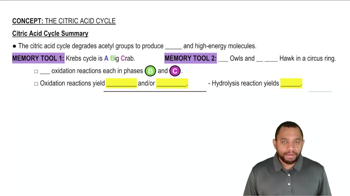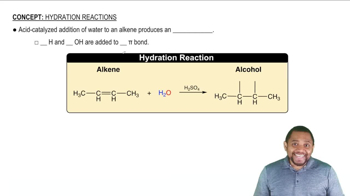Here are the essential concepts you must grasp in order to answer the question correctly.
Citric Acid Cycle
The citric acid cycle, also known as the Krebs cycle, is a series of enzymatic reactions that occur in the mitochondria, playing a crucial role in cellular respiration. It processes acetyl-CoA derived from carbohydrates, fats, and proteins to produce energy in the form of ATP, as well as electron carriers NADH and FADH2, which are essential for the electron transport chain.
Recommended video:
Citric Acid Cycle Summary Concept 12
Hydration Reaction
A hydration reaction involves the addition of water to a molecule, which can lead to the formation of alcohols or other functional groups. In the context of the citric acid cycle, hydration specifically refers to the conversion of fumarate to malate, where water is added to the double bond of fumarate, resulting in the formation of malate, an important intermediate in the cycle.
Recommended video:
Symmetric Alkene Hydration Concept 1
Enzymatic Catalysis
Enzymatic catalysis refers to the acceleration of chemical reactions by enzymes, which are biological catalysts. In the citric acid cycle, specific enzymes facilitate each step, including the hydration reaction, ensuring that the reactions occur efficiently and at a rate suitable for cellular metabolism. For the hydration of fumarate to malate, the enzyme fumarase catalyzes the reaction, highlighting the importance of enzymes in metabolic pathways.
Recommended video:
Triacylglycerol Reactions: Hydrolysis Concept 1
 Verified step by step guidance
Verified step by step guidance Verified Solution
Verified Solution



 :50m
:50m